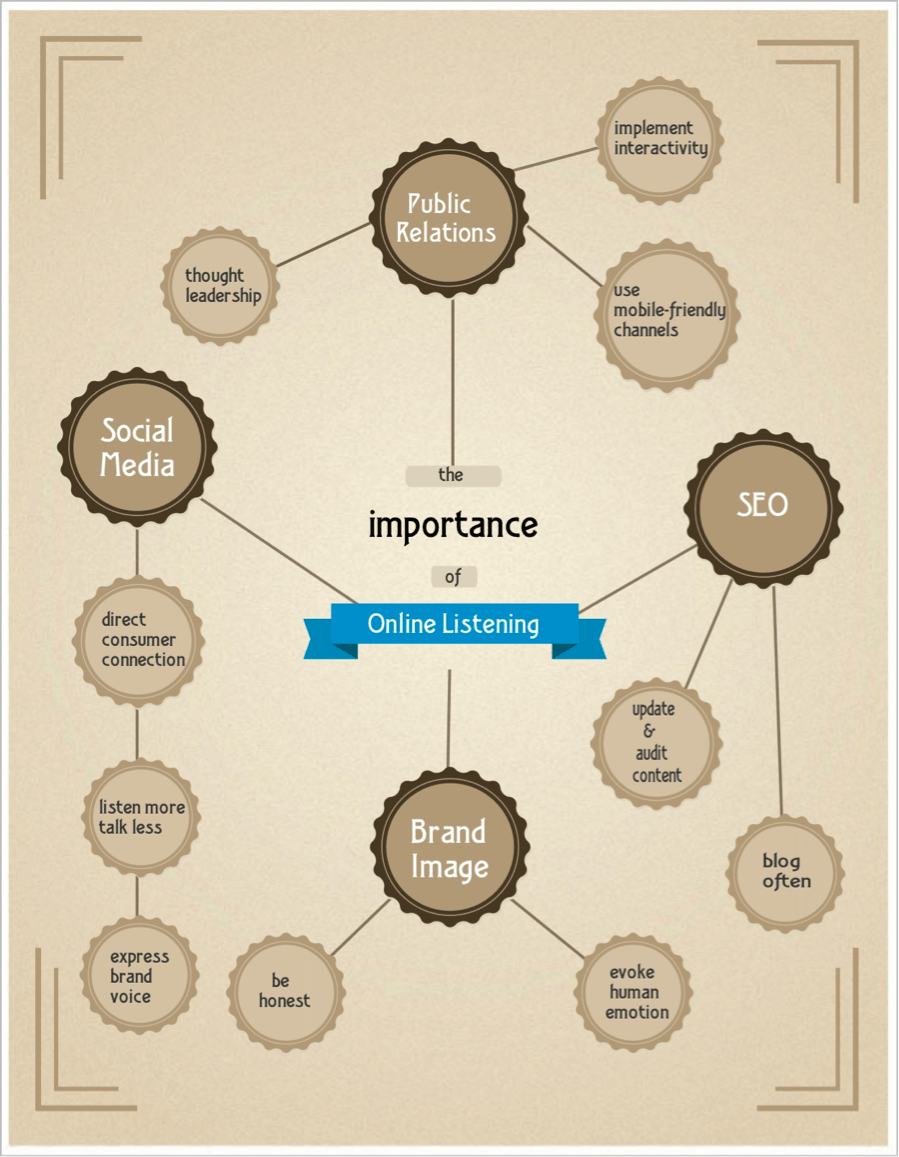
Successful Online Reputation Management: Best Practices
Understanding the essence of ‘Online Reputation Management’
Brands need a consumer to survive; that’s obvious. Consumers have also come to heavily rely on the Internet, which is clear as well. Knowing these truths, it’s hard to understand why any company would ignore the obvious and fail to maintain their online reputation. Integrating various online reputation management practices within your company’s marketing efforts will not only assist in reaching the staggering 2.5 billion active Internet users, but will serve in cultivating a community of dedicated brand advocates.
Now that over 62 percent of web users turn to the Internet as a primary research tool, there is a greater need than ever before to regulate the online chatter regarding a brand’s reputation. What potential and current customers say and see about a brand online is absolutely crucial in longevity. If you want your brand to sustain a long and healthy relationship with customers, online reputation management is a necessity.
A brand doesn’t typically find success without taking a little risk, but also can’t risk losing their customer base and breaking relationships with brand advocates. This is who ultimately holds the purchasing power and if a brand isn’t paying attention to issues brought to light online, the opportunity to reach out, resolve the issue and win back the business is missed. It is imperative to manage all facets of your online presence with knowledge and intent.
Manage Public Relations Like a Pro
Public relations can truly make or break a brand. These efforts establish a name and voice, create awareness and positive perception, and communicate the brand’s pillars and culture to the public in order to generate leads, increase sales or affect public opinion. For the purposes of online reputation management, a strong public relations strategy is crucial to success. The more positive press created and archived online for your company, the better your online reputation will be. When a user searches for your brand online, an effective public relations campaign will yield pages of positive news coverage including but not limited to company expansions or notable new hires, newsworthy events or happenings, key stakeholder mentions and quotes to show thought leadership, plus any additional positive public relations opportunities.
The key to achieving public relations success is to find the right audience, medium, and timing to most effectively convey a message.
- Implement interactivity: Capture the attention of your audience and beckon them to engage with your content by encouraging interaction. Studies show you have eight words to capture the reader’s attention and earn their attention needed to read the rest of the piece. You’ll also want to use simple, yet visually stimulating material. Incorporating videos and images in press releases is proven to increase views by over 45%. Additionally, articles with images receive up to 94% more total views than others.
- Think mobile friendly: User experience is considered one of the most important aspects of creating a strong social presence. Be sure to stay focused on your user’s experience and refrain from creating materials that are difficult to view on a mobile device. 90% of Americans own cell phones and 57% access the Internet using their mobile devices. Try to implement mobile channels into public relations campaigns, as Beyoncé did in her most recent online-only album release.
- Create thought leadership: By establishing your company and internal leaders as industry experts, you’ll be able to introduce new ideas and content into the online marketplace. Even in a crisis, user generated content will carry the weight of positive reviews.
Use SEO to Leverage Positive Content
Just as an effective public relations campaign creates a positive presence in all forms of media and alleviates controversy that may arise in a crisis situation, search engine optimization is another proven solution to deliver measurable results in maintaining a company’s positive online perception and counteracting unfavorable results that may be present online.
Gain control over what users are viewing by using search engine optimization to manage your online presence. According to Inc.com, 86% of consumers believe search engines are important in the buying process. So, what happens when an angry or dissatisfied customer or client posts negative reviews about your company online? Will that post tarnish your reputation? If you stay on top of what results are yielded in a quick online search of your company and use your positive coverage, like your public relations results, it doesn’t have to.
A well-rounded SEO strategy doesn’t simply cover up negative feedback, but makes the most of earned media, cultivates owned content and builds online communities.
“There are no barriers to entry and few defenses against those who would use the medium to attack rivals, sabotage competitors, or flaunt grudges.” – The Search Engine Guys
Optimize your online presence and create a positive digital footprint with the following methods:
- Audit your existing presence: Do the reviews your business currently has seem accurate and legitimate? Check to ensure a competitor or unhappy customer isn’t creating fake profiles or reviews.
- Create a social media strategy: What is your self-published content saying about you? Use social media to create the voice and personality you’d like your brand to have.
- Review owned content: Are you publishing blogs, articles or other content? Ensure you’re consistently proving yourself as an industry leader to stand out among competitors.
- Maintain or address existing content: If your company is self-publishing blogs or articles, ensure your content is up to date and reflects well on your image.
- Create an identity hub: Purchase any relevant domain names and URLs and direct them to your main website, along with any social media links. This will create a central hub of activity and direction for any user seeking information on your company.
- Post unique content: The more keyword-rich, unique content you’re creating for your own company, the better. Each piece of news or content that is picked up by the search engines assists in removing negative reviews or posts from the top search results.
- Hire someone to maintain your online identity: A proven agency can create a proactive, integrated SEO strategy including content planning, public relations, crisis management and web development to help your company stay ahead of the curve.
Create a Sense of Community on Social Media
Looking at online reputation management from a social perspective is vital to thriving in today’s digitally minded world. Consumers are more likely to become a customer and brand advocate when they have had the opportunity to understand the culture and voice, engage with the brand and build a relationship through conversation and repetitive exposure within their social space. So how do you know which platforms are right for you?
Think of the Internet as Planet Earth and each platform as a country. You wouldn’t travel to Mongolia with the intent to surf and speak Spanish with the locals. Likewise, you wouldn’t log into LinkedIn and post artsy photos of food you’re about to eat. This deteriorates your credibility as a leading authority in your industry.
Self-expression through imagery has dominated the social scene for major brands, especially with the influx of users on image-based platforms like Instagram, Vine, and Pinterest. Blogging and content sharing showcases your knowledge as an industry leader all while creating SEO gold by way of consistently updating and releasing content to be crawled and ranked by search engines. Additionally, viewing social media as one of the most crucial tools in your SEO strategy will guide you to make the most of the platforms to benefit your search ranking.
Creating a strong community in your social sphere will show any curious browser that your company is worth investing their loyalty in. Content strategies that showcase the best assets of your company and encourage users to share positive stories and experiences with your brand will create a trustworthy firsthand account to influence public opinion and purchasing behavior. Plus, your brand advocates can start speaking up for your company and defending it in the case of a negative post or review.
Nurture Your Brand’s Image
A successful brand name can’t stand alone, and it’s crucial to never stop evoking emotions from your consumers who help nurture your name and showcase the benefits of engaging with your brand. Tap into the consumer’s deepest emotion and hone in on their imagination. By speaking to their innermost wants and needs as a human being, you’ll be able to hook them immediately and drawn them in to find out more about what you have to offer. You’ll find that customers will start unconsciously choosing you over their competitors.
Additionally, ensure you’re building trust by only making promises to your audience that you can keep. Making a powerful statement that focuses on your mission and being up front and honest will inspire your customer to take action, and keeping control over your online reputation will alleviate any damage that has been done during a crisis situation and keep you connected with consumers. Brand advocates will rally around your company and create a long lasting relationship that will keep your brand strong and healthy as long as they feel you’re trustworthy and up front. Always leverage new trends online, keep the communication between your customers open and deepen existing relationships.
As Jeff Bezos says, “Branding is what people say about you when you are not in the room.”
What is your brand image saying about you?
